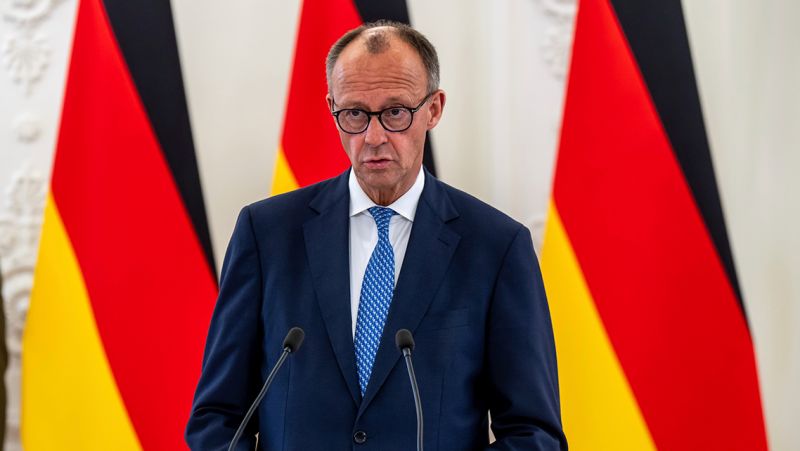Historic Inauguration of German Brigade in Lithuania to Strengthen NATO's Eastern Flank

Vilnius, Lithuania – In a significant development for NATO's defense strategy, Chancellor Friedrich Merz officially inaugurated a pioneering German brigade in Lithuania on Thursday. This brigade aims to bolster the security of NATO’s eastern flank amid ongoing concerns regarding Russian military aggression. Merz emphasized that the security of Lithuania and other Baltic nations is intrinsically linked to Germany's own security, stating, “the security of our Baltic allies is also our security.”
This inauguration marks a historic moment as it is the first time since World War II that a German brigade has been stationed outside of Germany on a long-term basis. Lithuanian President Gitanas Nausėda described the day as a milestone in the relationship between Germany and Lithuania, declaring it a day filled with “trust, responsibility, and action” following his meeting with Chancellor Merz.
The newly established brigade aims to reach its full operational capacity by 2027, with an anticipated troop strength of approximately 5,000 personnel. Germany has had a military presence in Lithuania since 2017, part of a broader NATO initiative to secure the eastern borders of the alliance. However, this new brigade signifies a deeper commitment to the region’s defense. The groundwork for the brigade began over a year ago, with a smaller activation staff already in place, growing to about 250 members by last fall.
During the inauguration ceremony, dozens of military helicopters flew over Vilnius’ central cathedral square, creating a dramatic backdrop as hundreds of troops and onlookers gathered to witness the event. Chancellor Merz reinforced the significance of the deployment, stating that “protecting Vilnius is protecting Berlin,” thus highlighting Germany's commitment to collective defense within NATO.
This deployment comes at a time when Germany is actively working to strengthen its military capabilities, a response that has gained urgency due to the heightened threat from Russia. The geopolitical landscape in Eastern Europe has been unstable, especially following Russia's full-scale invasion of Ukraine in February 2022, which has prompted NATO members to reconsider their defense strategies and increase military expenditures.
In his remarks, Chancellor Merz noted that Germany is “investing massively in its own armed forces,” which serves as a signal to other NATO allies to also boost their defense spending. He reiterated the importance of collective security within the alliance, asserting that “together with our partners, we are determined to defend alliance territory against every — every — aggression.”
Following the Russian invasion, former Chancellor Olaf Scholz made a landmark commitment to increase Germany’s defense spending to meet NATO’s target of 2% of GDP. This included the establishment of a special fund amounting to €100 billion ($113 billion) aimed at modernizing the Bundeswehr, Germany's armed forces. With this commitment, Germany successfully met NATO's spending target, although the special fund is projected to be depleted by 2027.
The new governing coalition in Germany, even before taking office, moved swiftly to enable increased defense spending by adjusting previously stringent fiscal rules regarding national debt. Merz, who is the first Chancellor to have served in the Bundeswehr, assured parliament that the government is committed to providing all necessary financing for the Bundeswehr to evolve into the strongest conventional army in Europe.
On the part of Lithuania, President Nausėda announced that the country plans to increase its defense budget to between 5% and 6% of GDP starting next year, a substantial rise from the current figure of just over 3%. This decision positions Lithuania as the first NATO member to commit to the 5% threshold advocated previously by former U.S. President Donald Trump. Furthermore, there are discussions among NATO allies to establish a defense spending goal of 3.5% of GDP by 2032, with an additional 1.5% earmarked for related infrastructure improvements.
Chancellor Merz expressed optimism regarding these targets, stating that they seem both sensible and attainable by the specified timeline. Additionally, German Defense Minister Boris Pistorius mentioned the plan to gradually increase defense spending by 0.2 percentage points each year over the next five to seven years.
As Merz steps into his role, he has also engaged in diplomatic efforts aimed at establishing a ceasefire in Ukraine. He reiterated Germany’s steadfast support for Ukraine while emphasizing the importance of a united European front, stating, “we stand firmly by Ukraine, but we also stand together as Europeans as a whole — and, whenever possible, we play in a team with the US.”




























